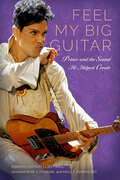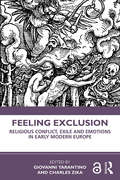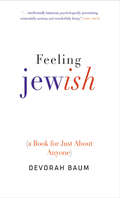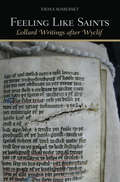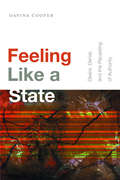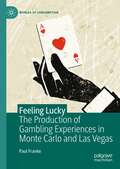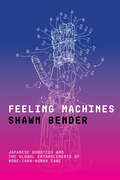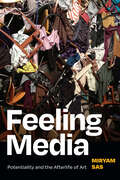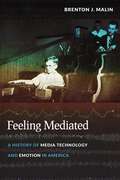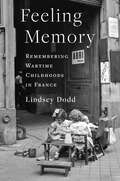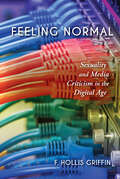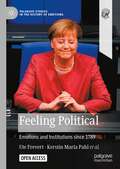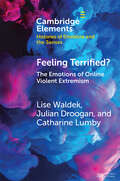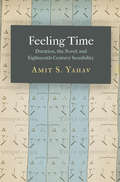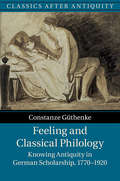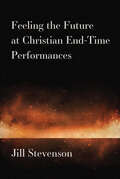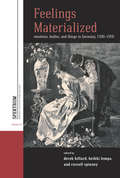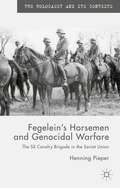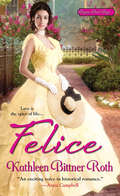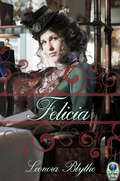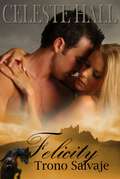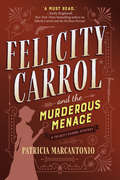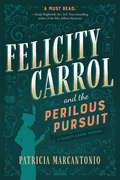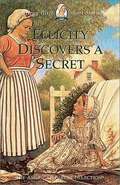- Table View
- List View
Feel My Big Guitar: Prince and the Sound He Helped Create (American Made Music Series)
by Judson L. Jeffries, Shannon M. Cochran, and Molly ReinhoudtContributions by Ignatius Calabria, H. Zahra Caldwell, Brian Jude de Lima, Sabatino DiBernardo, William Fulton, Antonio Garfias, Judson L. Jeffries, Tony Kiene, Molly Reinhoudt, Fred Shaheen, and Karen Turman With his signature blend of genres and lyrics that touch on myriad societal issues, the artist Prince (1958–2016) has challenged and captivated the minds and hearts of countless listeners. Feel My Big Guitar: Prince and the Sound He Helped Create is a wide-ranging collection that seeks to place Prince at the center of contemporary musical scholarship, putting him in proper cultural and political context. This edited volume includes a mix of essays and reflections by scholars and fans, as well as interviews with people who worked with and knew Prince personally. Employing a blend of methodologies, contributors offer a body of fresh, intriguing, thought-provoking, and mind-bending work about Prince—an artist whose music exemplified those very characteristics.The volume examines Prince's musical influences, his rivalries (both real and imagined), and instrumental eroticism. It includes enlightening interviews with early mentor Pépe Willie and Gayle Chapman, Prince’s first female bandmate. These personal reflections and interviews grant readers a unique lens through which to view Prince, enriching our overall understanding of the man. Ultimately, Feel My Big Guitar serves as a space for sharing musicological analysis and memories about an artist whose work has touched and inspired so many. Years in the making, this is the first book in an ongoing scholarly project, PrincEnlighteNmenT: A Study of Society through Music, intended to investigate and reveal the full spectrum of Prince’s life and work.
Feeling Exclusion: Religious Conflict, Exile and Emotions in Early Modern Europe
by Charles Zika Giovanni TarantinoFeeling Exclusion: Religious Conflict, Exile and Emotions in Early Modern Europe investigates the emotional experience of exclusion at the heart of the religious life of persecuted and exiled individuals and communities in early modern Europe. Between the late fifteenth and early eighteenth centuries an unprecedented number of people in Europe were forced to flee their native lands and live in a state of physical or internal exile as a result of religious conflict and upheaval. Drawing on new insights from history of emotions methodologies, Feeling Exclusion explores the complex relationships between communities in exile, the homelands from which they fled or were exiled, and those from whom they sought physical or psychological assistance. It examines the various coping strategies religious refugees developed to deal with their marginalization and exclusion, and investigates the strategies deployed in various media to generate feelings of exclusion through models of social difference, that questioned the loyalty, values, and trust of "others". Accessibly written, divided into three thematic parts, and enhanced by a variety of illustrations, Feeling Exclusion is perfect for students and researchers of early modern emotions and religion.
Feeling Jewish: (A Book for Just About Anyone)
by Devorah BaumIn this sparkling debut, a young critic offers an original, passionate, and erudite account of what it means to feel Jewish—even when you’re not. Self-hatred. Guilt. Resentment. Paranoia. Hysteria. Overbearing Mother-Love. In this witty, insightful, and poignant book, Devorah Baum delves into fiction, film, memoir, and psychoanalysis to present a dazzlingly original exploration of a series of feelings famously associated with modern Jews. Reflecting on why Jews have so often been depicted, both by others and by themselves, as prone to “negative” feelings, she queries how negative these feelings really are. And as the pace of globalization leaves countless people feeling more marginalized, uprooted, and existentially threatened, she argues that such “Jewish” feelings are becoming increasingly common to us all. Ranging from Franz Kafka to Philip Roth, Sarah Bernhardt to Woody Allen, Anne Frank to Nathan Englander, Feeling Jewish bridges the usual fault lines between left and right, insider and outsider, Jew and Gentile, and even Semite and anti-Semite, to offer an indispensable guide for our divisive times.
Feeling Like Saints: Lollard Writings after Wyclif
by Fiona Somerset“Lollard” is the name given to followers of John Wyclif, the English dissident theologian who was dismissed from Oxford University in 1381 for his arguments regarding the eucharist. A forceful and influential critic of the ecclesiastical status quo in the late fourteeth century, Wyclif’s thought was condemned at the Council of Constance in 1415. While lollardy has attracted much attention in recent years, much of what we think we know about this English religious movement is based on records of heresy trials and anti-lollard chroniclers. In Feeling Like Saints, Fiona Somerset demonstrates that this approach has limitations. A better basis is the five hundred or so manuscript books from the period (1375–1530) containing materials translated, composed, or adapted by lollard writers themselves.These writings provide rich evidence for how lollard writers collaborated with one another and with their readers to produce a distinctive religious identity based around structures of feeling. Lollards wanted to feel like saints. From Wyclif they drew an extraordinarily rigorous ethic of mutual responsibility that disregarded both social status and personal risk. They recalled their commitment to this ethic by reading narratives of physical suffering and vindication, metaphorically martyring themselves by inviting scorn for their zeal, and enclosing themselves in the virtues rather than the religious cloister. Yet in many ways they were not that different from their contemporaries, especially those with similar impulses to exceptional holiness.
Feeling Like a State: Desire, Denial, and the Recasting of Authority (Global and Insurgent Legalities)
by Davina CooperA transformative progressive politics requires the state's reimagining. But how should the state be reimagined, and what can invigorate this process? In Feeling Like a State, Davina Cooper explores the unexpected contribution a legal drama of withdrawal might make to conceptualizing a more socially just, participative state. In recent years, as gay rights have expanded, some conservative Christians—from charities to guesthouse owners and county clerks—have denied people inclusion, goods, and services because of their sexuality. In turn, liberal public bodies have withdrawn contracts, subsidies, and career progression from withholding conservative Christians. Cooper takes up the discourses and practices expressed in this legal conflict to animate and support an account of the state as heterogeneous, plural, and erotic. Arguing for the urgent need to put new imaginative forms into practice, Cooper examines how dissident and experimental institutional thinking materialize as people assert a democratic readiness to recraft the state.
Feeling Lucky: The Production of Gambling Experiences in Monte Carlo and Las Vegas (Worlds of Consumption)
by Paul FrankeMonte Carlo and Las Vegas have become synonymous with casino gambling. Both destinations featured it as part of a broad variety of leisure and consumption opportunities that normalized games of chance and created emotional atmospheres that supported the hedonistic aspects of gambling. Urban spaces and architecture were carefully designed to enable a rapid growth of the casino industry and produce experiences on previous unimaginable scale. Feeling Lucky, is a “making of story,” about cities which acquired a strange and captivating allure of mystery around them. It is more than a mere descriptive account, however. Combining urban history, the history of consumption, and sociological approaches it presents a compelling comparative history of Monte Carlo and the Las Vegas Strip between the 1860s and 1970s. Paul Franke takes the reader on a journey from arriving at the cities, through the carefully planned urban environments and into the famous casinos. The analysis follows the paths contemporary gamblers would have taken, right to the gambling tables and to the shifting gambling practices across a century. Franke shows that casino entrepreneurs succeeded in producing and selling gambling experiences by controlling spaces, adapt leisure practices and appeal to specific markets. Gamblers on the other hand regarded Monte Carlo and Las Vegas as places to engage in games of chance that would allow them to preserve their political, cultural, and moral identities.
Feeling Machines: Japanese Robotics and the Global Entanglements of More-Than-Human Care
by Shawn BenderIn recent years, debates over healthcare have accompanied rapid advances in technology, from the expansion of telehealth services to artificial intelligence driven diagnostics. In this book, Shawn Bender delves into the world of Japanese robots engineered for care. Care robots (kaigo robotto) emerged early in the 21st century, when roboticists began converting assembly line technologies into responsive machines for older adults and people with disabilities. These robots are meant to be felt and programmed to feel. While some greet them with enthusiasm, others fear that they might replace a fundamentally human task. Based on fieldwork in Japan, Denmark, and Germany, Bender traces the emergence of care robots in Japan and examines their impact on therapeutic practice around the world. Social science scholarship on robotics tends to be either speculative—imagining life together with robots—or experimental—observing robot-human interaction in laboratories or through short-term field studies. Instead, Bender follows roboticists developing technologies in Japan, and travels with the robots themselves into everyday sites of care, tracking the integration of robots into institutional care and the connection of care practice to robotics development. By exploring the application of Japanese robotics across the globe, Feeling Machines highlights the entanglements of therapeutic practice and technological innovation in an age of more-than-human care.
Feeling Media: Potentiality and the Afterlife of Art
by Miryam SasIn Feeling Media Miryam Sas explores the potentialities and limitations of media theory and media art in Japan. Opening media studies and affect theory up to a deeper engagement with works and theorists outside Euro-America, Sas offers a framework of analysis she calls the affective scale—the space where artists and theorists work between the level of the individual and larger global and historical shifts. She examines intermedia, experimental animation, and Marxist theories of the culture industries of the 1960s and 1970s in the work of artists and thinkers ranging from filmmaker Matsumoto Toshio, photographer Nakahira Takuma, and the Three Animators' Group to art critic Hanada Kiyoteru and landscape theorist Matsuda Masao. She also outlines how twenty-first-century Japanese artists—especially those responding to the Fukushima disaster—adopt and adapt this earlier work to reframe ideas about collectivity, community, and connectivity in the space between the individual and the system.
Feeling Mediated: A History of Media Technology and Emotion in America (Critical Cultural Communication #31)
by Brenton J. MalinNew technologies, whether text message or telegraph,inevitably raise questions about emotion. New forms of communication bring withthem both fear and hope, on one hand allowing us deeper emotional connectionsand the ability to forge global communities, while on the other promptinganxieties about isolation and over-stimulation. FeelingMediated investigates the larger context of such concerns, considering bothhow media technologies intersect with our emotional lives and how our ideasabout these intersections influence how we think about and experience emotionand technology themselves.Drawing on extensive archival research, Brenton J. Malin exploresthe historical roots of much of our recent understanding of mediated feelings,showing how earlier ideas about the telegraph, phonograph, radio, motionpictures, and other once-new technologies continue to inform our contemporarythinking. With insightful analysis, FeelingMediated explores a series of fascinating arguments about technology andemotion that became especially heated during the early 20th century. These debates, which carried forward andtransformed earlier discussions of technology and emotion, culminated in a setof ideas that became institutionalized in the structures of American mediaproduction, advertising, social research, and policy, leaving a lasting impact onour everyday lives.
Feeling Memory: Remembering Wartime Childhoods in France (The Columbia Oral History Series)
by Lindsey DoddWhat did it feel like to be a child in France during World War II? Feeling Memory is an affective exploration of children’s lives in wartime France and the ways they are remembered.Lindsey Dodd draws on the recorded oral narratives of a hundred people to examine the variety of experiences children had during the war. She considers different aspects of remembering, underscoring the centrality of emotion to memory. This book covers a wide range of locations—the country and the city, Occupied France and the Free Zone—and situations—well-off and poor children, those separated from their families and those with them; it places Jewish children’s experiences alongside non-Jewish children’s. Against the backdrop of momentous events, readers encounter children playing, working, eating, thinking, doing, and feeling.An investigation of the emotions of history, Feeling Memory argues for the transformative potential of affect theory and affective methodologies in oral history and the history of everyday life. This book makes major contributions to the history of France during World War II, understandings of children’s lives in war, and the use of memory in historical and oral history analysis.
Feeling Normal: Sexuality and Media Criticism in the Digital Age
by F. Hollis GriffinAn analysis of emerging LGBTQ+ media, queer spaces in urban areas, and sexual identity.The explosion of cable networks, cinema distributors, and mobile media companies explicitly designed for sexual minorities in the contemporary moment has made media culture a major factor in what it feels like to be a queer person. F. Hollis Griffin demonstrates how cities offer a way of thinking about that phenomenon. By examining urban centers in tandem with advertiser-supported newspapers, New Queer Cinema and B-movies, queer-targeted television, and mobile apps, Griffin illustrates how new forms of LGBTQ+ media are less “new” than we often believe. He connects cities and LGBTQ+ media through the experiences they can make available to people, which Griffin articulates as feelings, emotions, and affects. He illuminates how the limitations of these experiences—while not universally accessible, nor necessarily empowering—are often the very reasons why people find them compelling and desirable.“As a guide to emerging queer media of our new century, Hollis Griffin is funny, generous, passionate, and lucid. Whether he’s explaining Grindr’s memes or the gayborhoods of Chicago, cable travel programs or online networks, Griffin discovers how it feels to be queer in the digital age.” —Amy Villarejo, author of Ethereal Queer: Television, Historicity, Desire“Offers a piercing examination of modern identity politics focused on relationships among new forms of media consumption and marketplaces, urban centers, and the experiences of sexual minorities. . . . Feeling Normal is a must-read for scholars and students in queer studies and communication, media studies, film studies, and sociology.” —Choice
Feeling Political: Emotions and Institutions since 1789 (Palgrave Studies in the History of Emotions)
by Ute Frevert Michael Amico Francesco Buscemi Caroline Moine Philipp Nielsen Hannah Malone Juliane Brauer Kerstin Maria Pahl Agnes Arndt Karsten Lichau Julia WambachHistoricizing both emotions and politics, this open access book argues that the historical work of emotion is most clearly understood in terms of the dynamics of institutionalization. This is shown in twelve case studies that focus on decisive moments in European and US history from 1800 until today. Each case study clarifies how emotions were central to people’s political engagement and its effects. The sources range from parliamentary buildings and social movements, to images and speeches of presidents, from fascist cemeteries to the International Criminal Court. Both the timeframe and the geographical focus have been chosen to highlight the increasingly participatory character of nineteenth- and twentieth-century politics, which is inconceivable without the work of emotions.
Feeling Terrified?: The Emotions of Online Violent Extremism (Elements in Histories of Emotions and the Senses)
by Julian Droogan Lise Waldek Catharine LumbyThis Element presents original research into how young people interact with violent extremist material, including terrorist propaganda, when online. It explores a series of emotional and behavioural responses that challenge assumptions that terror or trauma are the primary emotional responses to these online environments. It situates young people's emotional responses within a social framework, revealing them to have a relatively sophisticated relationship with violent extremism on social media that challenges simplistic concerns about processes of radicalisation. The Element draws on four years of research, including quantitative surveys and qualitative focus groups with young people, and presents a unique perspective drawn from young people's experiences.
Feeling Time: Duration, the Novel, and Eighteenth-Century Sensibility
by Amit S. YahavLiterary historians have tended to associate the eighteenth century with the rise of the tyranny of the clock—the notion of time as ruled by mechanical chronometry. The transition to standardized scheduling and time-discipline, the often-told story goes, inevitably results in modernity's time-keeper societies and the characterization of modern experience as qualitatively diminished.In Feeling Time, Amit Yahav challenges this narrative of the triumph of chronometry and the consequent impoverishment of individual experience. She explores the fascination eighteenth-century writers had with the mental and affective processes through which human beings come not only to know that time has passed but also to feel the durations they inhabit. Yahav begins by elucidating discussions by Locke and Hume that examine how humans come to know time, noting how these philosophers often consider not only knowledge but also experience. She then turns to novels by Richardson, Sterne, and Radcliffe, attending to the material dimensions of literary language to show how novelists shape the temporal experience of readers through their formal choices. Along the way, she considers a wide range of eighteenth-century aesthetic and moral treatises, finding that these identify the subjective experience of duration as the crux of pleasure and judgment, described more as patterned durational activity than as static state.Feeling Time highlights the temporal underpinnings of the eighteenth century's culture of sensibility, arguing that novelists have often drawn on the logic of musical composition to make their writing an especially effective tool for exploring time and for shaping durational experience.
Feeling and Classical Philology: Knowing Antiquity in German Scholarship, 1770–1920 (Classics after Antiquity)
by Constanze GüthenkeNineteenth-century German classical philology underpins many structures of the modern humanities. In this book, Constanze Güthenke shows how a language of love and a longing for closeness with a personified antiquity have lastingly shaped modern professional reading habits, notions of biography, and the self-image of scholars and teachers. She argues that a discourse of love was instrumental in expressing the challenges of specialisation and individual formation (Bildung), and in particular for the key importance of a Platonic scene of learning and instruction for imagining the modern scholar. The book is based on detailed readings of programmatic texts from, among others, Wolf, Schleiermacher, Boeckh, Thiersch, Dilthey, Wilamowitz and Nietzsche. It makes a case for revising established narratives, but also for finding new value in imagining distance and an absence of nostalgic longing for antiquity.
Feeling the Future at Christian End-Time Performances
by Jill C StevensonThe End is always near. The Apocalypse has sparked imaginations for millennia, while in more recent times, highly publicized predictions have thrust End-Time theology briefly into the spotlight. In the 21st century, fictional depictions of various apocalyptic scenarios are found in an endless stream of films, TV shows, and novels, while real-world media coverage of global issues including climate change and the migrant crisis often features an apocalyptic tone. Feeling the Future at Christian End-Time Performances explores this prevalent human desire to envision the End by analyzing how various live End-Time performances allow people to live in and through future time. ? The book’s main focus is contemporary Christian End-Time performances and how they theatrically construct encounters with future time—not just images or ideas of a future, but viscerally and immediately real experiences of future time. Author Jill Stevenson’s examples are Hell Houses and Judgement Houses; Rapture House, a similarly styled “walk through drama” in North Carolina; Hell’s Gates, an “outdoor reality drama” in Dawsonville, Georgia; Ark Encounter, a full-size recreation of Noah’s Ark; and Tribulation Trail, an immersive thirteen-scene drama ministry based on the Book of Revelation. The book’s coda considers similarities between these Christian performances and secular survivalist prepper events, especially with respect to constructions of and language about time. In doing so, the author situates these performances within a larger tradition that challenges traditional secular/sacred distinctions and illuminates how the End Times has been employed in our current social and political moment.
Feeling the Future at Christian End-Time Performances
by Jill C. StevensonThe End is always near. The Apocalypse has sparked imaginations for millennia, while in more recent times, highly publicized predictions have thrust End-Time theology briefly into the spotlight. In the 21st century, fictional depictions of various apocalyptic scenarios are found in an endless stream of films, TV shows, and novels, while real-world media coverage of global issues including climate change and the migrant crisis often features an apocalyptic tone. Feeling the Future at Christian End-Time Performances explores this prevalent human desire to envision the End by analyzing how various live End-Time performances allow people to live in and through future time. The book’s main focus is contemporary Christian End-Time performances and how they theatrically construct encounters with future time—not just images or ideas of a future, but viscerally and immediately real experiences of future time. Author Jill Stevenson’s examples are Hell Houses and Judgement Houses; Rapture House, a similarly styled “walk through drama” in North Carolina; Hell’s Gates, an “outdoor reality drama” in Dawsonville, Georgia; Ark Encounter, a full-size recreation of Noah’s Ark; and Tribulation Trail, an immersive thirteen-scene drama ministry based on the Book of Revelation. The book’s coda considers similarities between these Christian performances and secular survivalist prepper events, especially with respect to constructions of and language about time. In doing so, the author situates these performances within a larger tradition that challenges traditional secular/sacred distinctions and illuminates how the End Times has been employed in our current social and political moment.
Feelings Materialized: Emotions, Bodies, and Things in Germany, 1500–1950 (Spektrum: Publications of the German Studies Association #21)
by Derek Hillard Heikki Lempa Russell SpinneyOf the many innovative historiographical approaches to emerge during the twenty-first century, one of the most productive has been the nexus of theories and methodologies broadly defined as “the history of emotions.” While this conceptual toolkit has generated significant insights into the past, it has overwhelmingly focused on emotions as linguistic and semantic phenomena. This edited volume looks instead to the material aspects of emotion in German culture, encompassing body, literature, photography, aesthetics, and a variety of other themes.
Fegelein's Horsemen and Genocidal Warfare
by Henning PieperThe SS Cavalry Brigade was a unit of the Waffen-SS that differed from other German military formations as it developed a 'dual role': SS cavalrymen both helped to initiate the Holocaust in the Soviet Union and experienced combat at the front.
Felice (Bayou Bad Boys #2)
by Kathleen Bittner RothWhen beautiful shipping heiress Felicité Marielle Christiane Andrews finally returns to New Orleans after two years abroad, she does not expect to come face to face with the man she cannot forget—or to find him more captivating than ever. Now she must remind herself that she: Lives a fabulous life in EnglandIs engaged to marry a fine man of nobilityCannot allow the wicked Cajun back into her life… …But indeed, she does. Charismatic René Thibodeaux, illegitimate son of a voodoo witch, has worked hard to rise above his poverty-stricken bayou youth. He’s put his thieving and womanizing days behind him and earned a high-ranking position at Felice’s father’s company. Seeing her again only intensifies his longing for her—and his deep remorse for his past foolishness. But despite his success, he must remind himself: He is unworthy of Felice in every wayShe is forbidden fruitHe will do anything to win her—even risk his life… “An extremely promising writer of American historical romance.” –Booklist on Josette “Gripped me from the opening page…kept me reading long into the night.” --Jodi Thomas on Alanna “A story to be savored.” –Publishers Weekly on Celine
Felicia
by Leonora BlytheA fateful accident leaves a lady with amnesia—and in the arms of a handsome rake—in this Regency romance by the author of Lady Tara. After her mother&’s death, young Miss Felicia is sent by her aunt to take a governess position in Manchester. Though she will miss her friends from home, she is quite happy to forget her bitter aunt and selfish cousin. Unfortunately, she is about to forget far more . . . When dashing Lord Umber rescues Felicia from a coach accident, he judges from her drab travelling clothes that she is merely a wench for fun and games. He knows nothing about her aristocratic heritage—but then, neither does she. A severe blow to her head has quite driven all her memory away. Now Felicia may not remember her past, but she is as guarded about her future as she ever was. And she&’s not about to let herself be seduced by a glamourous stranger . . .
Felicity
by Celeste HallJerrard es un Ranger, uno de los grupos de guerreros de élite que aún luchan por proteger al pueblo de la invasión de la Horda. Son espectros en el bosque. Asesinos silenciosos que pueden atacar y desaparecer de nuevo antes de que el enemigo se dé cuenta de que está siendo atacado. Su clase es una raza en extinción. La corrupción del rey ha costado demasiadas vidas. Ahora todos están en peligro. Jerrard ya está desafiando sus lealtades cuando el rey le envía a rescatar a la hija de un noble. Felicity es hermosa y apasionada. Rápidamente se da cuenta de que ella es el cebo de una trampa cuidadosamente tendida para destruirlo. Enamorarse de ella es una sentencia de muerte. Sin embargo, se siente irresistiblemente atraído por sus brazos.
Felicity Carrol and the Murderous Menace: A Felicity Carrol Mystery (A Felicity Carrol Mystery #2)
by Patricia MarcantonioHeiress and amateur detective Felicity Carrol makes a perilous journey to apprehend a notorious murderer who has terrorized England--and now continues his vicious killing spree across the pond.Felicity Carrol would rather be doing just about anything other than attending balls or seeking a husband. What she really wants to do is continue her work using the latest forensic methods and her photographic memory to help London police bring murderers to justice, so when her friend, Scotland Yard Inspector Jackson Davies, weak from injury, discovers a murder in a wild mining town in Montana that echoes the terrible crimes in England, Felicity decides to go herself.In Placer, Montana, her first obstacle is handsome lawman Thomas Pike, who uses his intuition as much as his Colt in keeping law and order in this unruly town. When the murderer strikes again, Felicity begins to suspect Davies is correct: Jack the Ripper has come to America. Felicity sets out to find the killer in a town chock full of secrets, shadows, and suspects, but as the body count rises, this intrepid sleuth faces her most dangerous adversary yet--and discovers that not all killers are as they seem.
Felicity Carrol and the Perilous Pursuit: A Felicity Carrol Mystery (A Felicity Carrol Mystery)
by Patricia MarcantonioAmidst the heraldry of Queen Victoria's Golden Jubilee celebrations, a string of brutal murders rocks Britain's upper crust—and could threaten the realm itself—in the spellbinding debut of Patricia Marcantonio's Felicity Carrol mysteries.Felicity Carrol is interested in everything—except being a proper young matron of Victorian society. Brilliant and resourceful, Felicity took refuge in science and education after her mother died and her father abandoned her to servants. Now, all he wants is for her to marry into a family of status and money.Felicity has other ambitions—but her plans shudder to a halt when her mentor is murdered at the British Museum and his priceless manuscript of King Arthur lore is stolen. Tapping into her photographic memory and the latest in the burgeoning field of forensic detection, Felicity launches an investigation. Handsome Scotland Yard Inspector Jackson Davies is also on the case, and finds Felicity as meddlesome as she is intelligent. But when more nobles are murdered and their King Arthur relics stolen, Felicity must journey on her own into the dark underworld of antiquity theft, where she uncovers a motive far more nefarious than simple profit.As the killer sets his sights on a new victim—a charismatic duke who has captured Felicity’s imagination—the stakes rise to impossible heights. It’s a case that could shake the kingdom in Patricia Marcantonio’s series debut, Felicity Carrol and the Perilous Pursuit.
Felicity Discovers A Secret (American Girls Short Stories #19)
by Valerie TrippIn Felicity Discovers a Secret, Felicity's hoop gets her into trouble. Now Felicity must spend a day with Mrs. Burnie, the crabbiest woman in town. Felicity can't seem to do anything right under Mrs. Burnie's watchful eye. But then she discovers Mrs. Burnie's secret...
